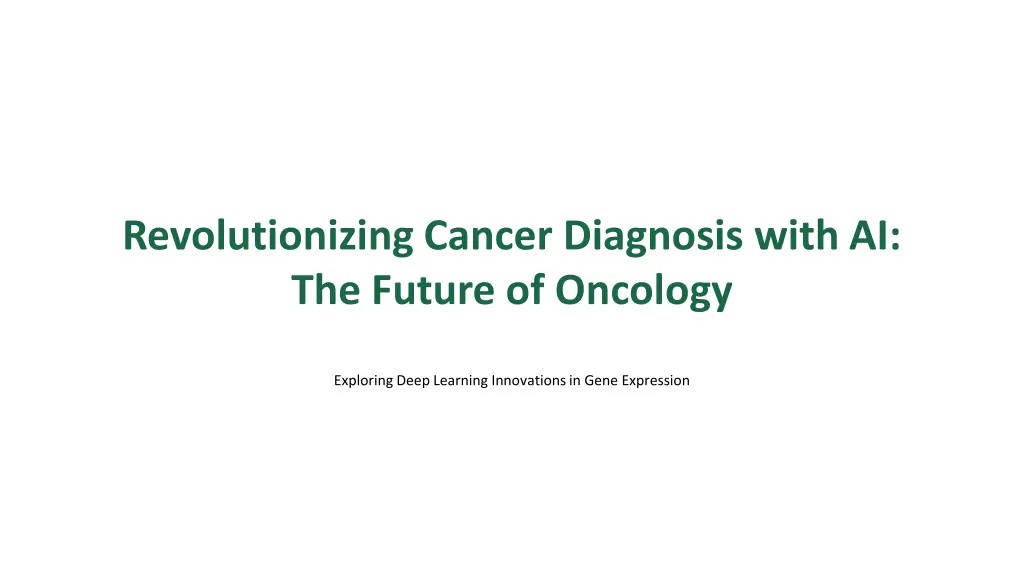
Revolutionizing Cancer Diagnosis with AI: Exploring Deep Learning Innovations in Oncology
"Discover how AI and deep learning technologies are revolutionizing cancer diagnosis by leveraging gene expression data. Explore the power of advanced algorithms in improving early detection and personalized medicine for better patient outcomes."
Download Presentation

Please find below an Image/Link to download the presentation.
The content on the website is provided AS IS for your information and personal use only. It may not be sold, licensed, or shared on other websites without obtaining consent from the author. If you encounter any issues during the download, it is possible that the publisher has removed the file from their server.
You are allowed to download the files provided on this website for personal or commercial use, subject to the condition that they are used lawfully. All files are the property of their respective owners.
The content on the website is provided AS IS for your information and personal use only. It may not be sold, licensed, or shared on other websites without obtaining consent from the author.
E N D
Presentation Transcript
Revolutionizing Cancer Diagnosis with AI: The Future of Oncology Exploring Deep Learning Innovations in Gene Expression
01 Understanding the Cancer Epidemic Table of Contents 02 The Power of Gene Expression Data 03 Deep Learning: A Catalyst for Change 04 Analyzing Research Trends in Cancer Studies 05 Contributions and Future Directions 06 Thank You for Your Attention!
1 Understanding the Cancer Epidemic Cancer remains one of the world's deadliest challenges, with strikingly high prevalence rates requiring urgent attention. Early detection and treatment are crucial to improvingsurvival rates and understanding cancer dynamics. 2020 statistics showed a significant shift in cancer cases, with breast cancer cases surpassing lung cancer, indicating a need for tailored approaches. About two-thirds of cancers are diagnosed at an early stage, emphasizing the importance of ongoing research and advanced identification methods. The integration of technology is vital for enhancing early detection and appropriate treatment pathways.
2 The Power of Gene Expression Data Gene expression analysis through DNA microarrays presents a revolutionary approach for diagnosing and prognosing specific cancer subtypes. Analyzing gene expression data allows us to uncover vital biological markers and therapeutic targets in complex cancers. AI and machine learning algorithms play essential roles in extracting significant features from vast datasets. These technologies are not just beneficial; they are becoming foundational in the journey of cancer research and clinical practices. Understanding this relationship between gene data and cancer can lead to breakthroughs in patient outcomes.
3 Deep Learning: A Catalyst for Change Deep learning technologies, including Convolutional Neural Networks and Autoencoders, are transforming oncology research. These algorithms offer powerful ways to interpret complex datasets, significantly aiding clinical decision- making in cancer treatment. Their applications extend across various industries, showcasing their adaptability and importance in health care. A substantial body of literature reveals their efficacy in drivingaccurate diagnoses and personalized medicine. As we leverage deep learning, we move closer to precision oncology.
4 Analyzing Research Trends in Cancer Studies Recent studies from the last five years highlight the growing importance of gene expression data in cancer research. A notable number of these publications emerged in 2018 and 2019, reflecting a surge in scientific interest and technological advancements. Research focusing on cancer diagnosis, survival prediction, and staging is paramount in enhancing clinical practices. visual representation of year-wise distribution of related articles illustrates the progressive focus on these critical areas. This research landscape underlines the relentless pursuit of innovation in cancer diagnosis.
5 Contributions and Future Directions This study offers a comprehensive review of advancements in deep learning techniques for gene expression analysis. It provides insights into successful architectures that are streamlining the detection of chronic conditions, including cancer. Comparative analyses of various optimizers applied to RNA sequence datasets highlight new pathways for research. These contributions are vital in redefining how we approachcancer diagnosis and treatment strategies. By continuously improving our methods, we pave the way for groundbreaking healthcare solutions.
6 Thank You for Your Attention! Together, we can tackle the challenges posed by cancer throughinnovative research and technology. Your engagement and support in cancer research are essential for making progress. Let's continue to inspire one another to push the boundaries of what's possible in oncology. Every effort counts in this fight against cancer; together, we can make a difference. Thank you for being a part of this journey!
